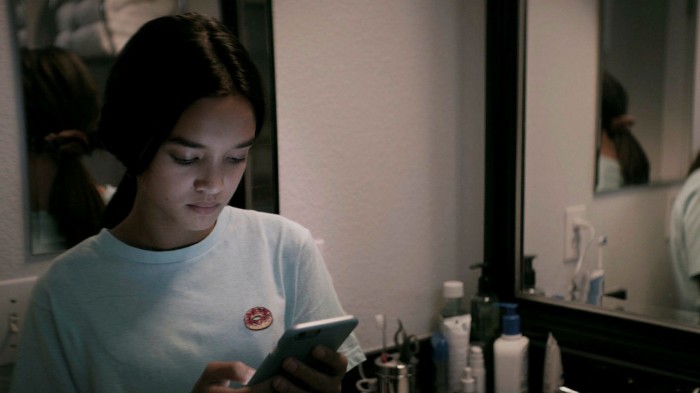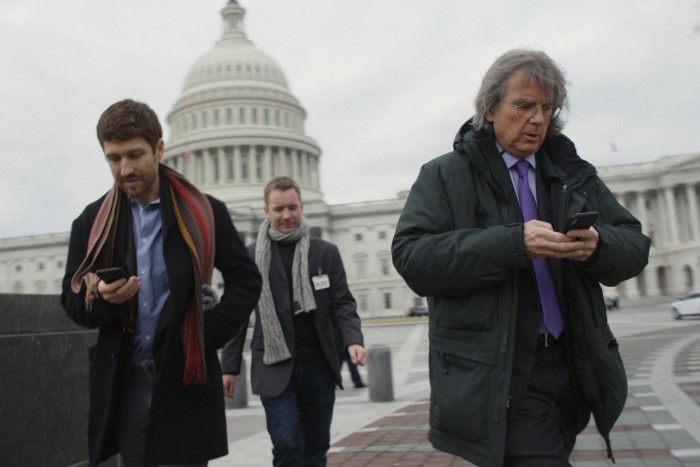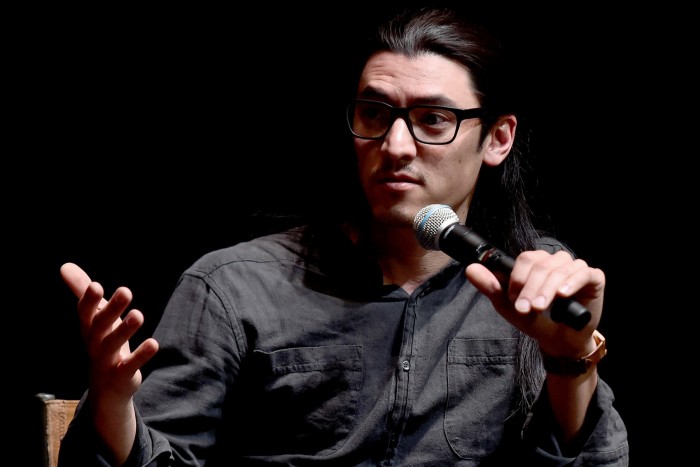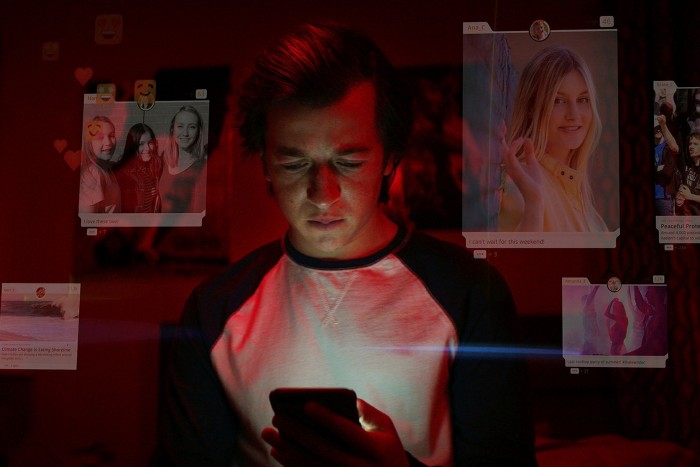How Netflix film The Social Dilemma probes the dark side of tech

Simply sign up to the Film myFT Digest -- delivered directly to your inbox.
The Social Dilemma opens with a quote from Sophocles. “Nothing vast enters the life of mortals without a curse,” it reads darkly, referring to the corrosive influence of technology on the individual and society.
The docudrama shows ex-employees of Silicon Valley giants perched anxiously on stools and sharing ethical concerns about the systems they helped to create. They include Tristan Harris, previously a design ethicist at Google; Bailey Richardson, a former member of Instagram’s community team; Tim Kendall, the one-time president of Pinterest; and Justin Rosenstein, a software programmer who helped create the Facebook “Like” button.
The interviews are interspersed with fictional scenes about a tech-happy family and the effects of their online habits. Teenager Ben (Santa Clarita Diet’s Skyler Gisondo) hoovers up dangerous online conspiracy theories, while his tween sister, Isla (Sophia Hammons), seeks validation through heavily filtered selfies. Mad Men’s Vincent Kartheiser represents the AI programs designed to keep them scrolling, presented here as a behind-the-scenes puppet master, frantically manipulating users from his command centre. When he observes Ben disengaging from social media, he sends him a notification about an ex-girlfriend’s relationship status to reel him back in.
The film is directed by Jeff Orlowski, who made the Emmy-winning climate change documentary Chasing Ice in 2012, and its 2017 follow-up Chasing Coral. He was inspired by a conversation with Harris, with whom he studied at Stanford. “He helped me realise there’s an existential threat [from technology],” Orlowski tells me over Zoom from his home in Boulder, Colorado. “This is the climate change of culture that’s happening visibly through our devices. It was a huge lightbulb moment for me.”
Orlowski, 36, has long admired Al Gore’s 2006 call to arms on global warming, An Inconvenient Truth, and wants The Social Dilemma to be the “Inconvenient Truth of tech”. But where Gore used graphs and flow charts to get his point across, Orlowski relies on apocalyptic testimony from one-time insiders.

The film reveals the extent to which social media and other platforms can isolate and manipulate users, reinforcing existing interests and viewpoints while stoking societal divisions. It shows how our time and attention is monetised, how there is more profit in disinformation than in truth, and the ways in which democracy is being eroded.
We also learn of the impact on young people’s sense of identity and self-worth, and their ability to connect with others. The social psychologist and NYU professor Jonathan Haidt observes a “gigantic increase” in depression and anxiety among American pre-teen and teenage girls since 2011, coinciding with the rise of social media. According the Centers for Disease Control and Prevention, there was a 62 per cent rise in girls aged 15 to 19 being admitted to hospital for self-harm, and 189 per cent in 10 to 14-year-olds. Yet the platforms continue to feed their tech addiction and keep them plugged in.
The most prominent contributor is Harris, who is now co-founder of the Center for Humane Technology, a non-profit organisation advocating ethical practice in the tech sphere, and has briefed heads of state about the dark side of Silicon Valley. He is emphatic about the methods major platforms deploy to keep us engaged and the ways we are tracked online. “People think ‘Google’s just a search box and Facebook’s just a place to see what my friends are doing and see their photos’,” he says in the film. “What they don’t realise is they’re competing for your attention . . . Social media isn’t a tool that’s just waiting to be used. It has its own goals and it has its own means of pursuing them by using your psychology against you.”

Making the film was a steep learning curve for Orlowski, who says the biggest revelation was how these platforms make money. “I spend thousands of dollars on Apple products so I understand why Apple is worth a lot of money, because I’m giving them a lot of money, right?” he says. “But how are Facebook and Google worth so much? There’s this saying, ‘If you’re not paying for the product, you are the product.’ They’re making their money off this manipulative advertising model that nobody understands. That’s why we did the narrative portion of the film to anthropomorphise the algorithms and to see the machine behind. Literally, there’s a model of every single one of us that’s being tested on all the time . . . to figure out what makes them more money and who they can sell us to. That was a real slap in the face for me.”
The film does present a one-sided view of big tech, however. Orlowski elected not to offer the companies under scrutiny a chance to defend themselves, taking the view that former employees, rather than current ones, would be more “unbounded to speak their truth”. In any case, he says, “we are hearing the Facebook and Google party line all the time through their press and advertising where they’re saying, ‘Look at us improving freedom and democracy’.”
Orlowski admits that he was once a full-blown Facebook addict — “During the 2016 [US] elections, I couldn’t get off it. It had figured out what worked on me, which was political polarisation. Soon after that, I started speaking with Tristan about these issues and began to wean myself off.” He subsequently observed Facebook going to great lengths to get him to re-engage. “It would send me an email, and then a text message, and then a link to a photo of someone,” he says. “I could see how the program was trying to get me back on the platform and it made me feel really disgusted.”

Orlowski nonetheless maintains that he loves technology and believes it can be a force for good. “We’ve drifted away from what it could be,” he says. “In the film we invoke [the late Apple boss] Steve Jobs quote that computers should be ‘a bicycle for our minds’. That’s what his hope for computers was — that they could take us and move us faster and further, and could be tools that enhance humanity. But now we’ve built tools that manipulate and distort and extract humanity. We’ve messed up.”
So, what is the answer? The film makes clear that there is no quick solution to solving the issues it raises about our online lives, but Orlowski hopes that greater understanding about how users are being manipulated will bring about a drive towards more ethical technology. As the credits roll on the film, its contributors offer advice on ways to reduce our online dependence. They suggest turning off all notifications on your phone, never clicking on recommended content and always fact-checking before sharing anything. All are agreed on not giving devices to children, or at least limiting their use.
Jaron Lanier, the writer, computer scientist and vociferous campaigner against social media, goes a step further, however. “Get out of the system!” he exclaims. “Yeah, delete! Get off the stupid stuff. The world’s beautiful. It’s great out there!”
‘The Social Dilemma’ is on Netflix from September 9
Comments